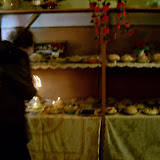I’m no political scientist but I have a few ideas about the recent Bulgarian presidential election. The election was last Sunday and due to the low voter turnout, there will be a run-off election this coming Sunday. The two candidates in the run-off will be Georgi Parvanov (the incumbent and winner of the first election) and Volen Siderov (leader of the ultra-nationalist Ataka party). The fact that Parnanov won the election is unsurprising; the second place finish of an ultra-nationalist, however, is a bit alarming. I believe that the second place finish of this candidate speaks more about the current situation of Bulgaria than an overwhelming racist and xenophobic society. I think that people voted for Ataka for some of the following reasons:
1. Fed-up. I think that many Bulgarians are simply fed-up with the status quo. I believe that many Bulgarians are tired of having to work so hard to make ends meet. They are tired of seeing everyone’s wealth growing while theirs shrinks and shrinks. They see people around them, people they always assume to be mafia, getting rich, while they have barely enough money to keep warm in the winter. Remember, Bulgaria currently has an unemployment rate of 12% and 13% of the people are people are below the poverty line. In parliament, they claim that their politicians are arguing about what to do with the old king’s land and not much else. Ataka wants a drastic change in the government and the way the system works.
Ataka’s preoccupation with Bulgarian Roma is another example of being fed-up. They are making Roma into scapegoats for why things are wrong. They think that Roma are getting all the money from the government and international organizations that should rightfully go to “honest, hard-working Bulgarians” (I find this argument kind of hard to swallow, especially since Roma make up less than 5% of the population). This is very similar to the way racism works in the good ol’ US of A, and I assume most other places. People see others getting “handouts” and want a piece of the action.
2. Pride. Bulgarians are proud people. They are quick to tell a visitor about the beautiful Bulgarian Black Sea coast, mountains and women. They also readily tell anyone willing to listen that once upon a time, Bulgaria, Rome and Byzantium were the only empires in Europe. They also remind you that Bulgaria is one of a handful of countries to have sent a man into space and that the father of the founder of IBM was a Bulgarian. They are embarrassed of the current state of the country and the fact that people don’t pay attention to this small country. Ataka plays upon this pride, and reminds people that they should be proud of their country.
3. The good ol’ days. Many Bulgarians yearn for what they consider the good ol’ days. They remember the communist era when allegedly everyone had what they needed, everyone was employed and there was no risk of losing a job. Life was so much easier, they say. They also remember a mythical time when people worked the land, harvested all day and danced the horo all night long. I think in someway they want those times back, whether they really existed or not. I hate when analogies with Nazi Germany are tossed around, so I will use the more general fascist analogy. Fascists groups thrive on these kind of memories. They love to conjure the images of a pure, idyllic, innocent time full of pure, idyllic and innocent people (all belonging to one ethnicity, of course) and they use these images to hook people. Ataka not only plays on the hate of Roma, but also Turks. They regularly remind everyone that the Turks oppressed the Bulgarians for 500 years. Ataka is employing no different strategy than what has been successful for all the other fascist groups throughout the second half of the 20th century.
4. Anti-BSP. While some people are in love with the idea of the great communist era, they still can’t bring themselves to vote for the current socialist party, BSP. This is the party of the current president and leading party of the parliament. I know a couple people who refuse to vote in this election because they don’t want Ataka to lead the country but they can’t stand the thought of voting for “those communists.” For some people it is less conflicted, they hate the communists and will vote for Ataka to show them that hate. It is not surprising that Ataka started to rise at the same time that BSP did.
5. Anti-globalization. Some people are simply afraid of the upcoming EU accession and the current NATO membership. People are afraid of losing their national rights so soon after gaining them. Some of Ataka’s big issues are anti-privatization and keeping Bulgaria’s nuclear reactor open. They dislike EU’s calls to privatize such things as coal mines (a big deal in Bobov dol) and to shut down the reactor. They want to retain a certain amount of national independence and after so many years of oppression one can hardly blame them. People are also afraid of the unknown. They see some of the birthing pains that other ascending countries have undergone and don’t want the same thing to happen to them. NATO-wise, they are also afraid of being dragged into a war they shouldn’t be fighting. You don’t have to look any farther than Iraq to see that maybe they have a point.
I am by no means an Ataka sympathizer. I am pretty secure in my left-wing politics. I simply want to show that maybe Ataka isn’t gaining in popularity because all Bulgarians hate Roma and Turks. Remember, over 60% of voters voted for the BSP candidate, about triple the amount for Ataka. But there is a significant number of Bulgarians who have legitimate complaints about the current status-quo and fears about the future. I suspect that while Parvanov will win the next election on Sunday, the gap between Parnanov and Siderov will be a lot closer. I’d like to hear what other volunteers think, please post a comment.
24 October 2006
Subscribe to:
Post Comments (Atom)


2 comments:
Though on a national level I am sure your analysis hit the nail on the head, in my town I know Ataka is popular on the Roma issue alone. My celski hora hate Roma, which make up half the town, and are very very vocal about it.
Let me just say here...if Ataka ever gains substantial ground, I am smuggeling my host family into America and we'll watch the horror of the next Balkan genocide unfold on CNN.
I'm just so happy that an american person, is interested in our small country.That managed to feel the esence of Bulgaria
Post a Comment